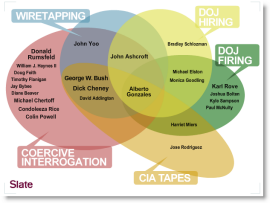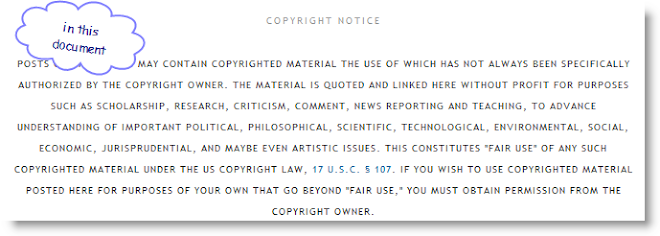"In sum, we believe the evidence shows that the complaints about Iglesias from New Mexico Republican politicians and party activists, both to the Department and to the White House, caused Sampson to place Iglesias on the removal list. Once Iglesias was on the list, none of the senior Department leaders questioned his inclusion or asked that he be taken off the list.
We believe that Senator Domenici’s complaints were the primary factor for Iglesias’s placement on the list. Although Gonzales and McNulty stated that Domenici never directly asked the Department to replace Iglesias, the nature of Domenici’s criticisms left little doubt that he wanted a new U.S. Attorney in New Mexico. Gonzales said that Domenici “complained about . . . whether or not Mr. Iglesias was capable of continuing in that position.” According to McNulty, Domenici criticized Iglesias’s handling of public corruption cases and said that Iglesias was “in over his head.” McNulty said that Domenici’s assertiveness and tone during the conversation were “striking.”
Yet, we found no evidence that anyone in the Department examined any of the complaints about Iglesias through any careful or objective analysis. Although Gonzales said he asked Sampson to look into Rove’s concerns about voter fraud enforcement in New Mexico, Gonzales never followed up with Sampson about his findings or to ensure that the complaints were objectively examined. McNulty said he did not take any steps to find out what had triggered Domenici’s telephone call or take any steps “of an investigative nature” in response. Gonzales told us that in retrospect he would have expected that someone would have looked into the complaints. Gonzales said “you can’t have, you know, a member of Congress calling and making an allegation and not checking it out and seeing whether or not there’s anything there to it.”
However, no one reached out to anyone in the U.S. Attorney’s Office or the FBI to ask about the voter fraud or public corruption cases, or whether Iglesias was inappropriately delaying an indictment in a prominent public corruption investigation. More importantly, no one in the Department ever asked Iglesias about these complaints, or why he had handled the cases the way he did. Rather, Gonzales, McNulty, Sampson, and those involved in the decision to remove Iglesias accepted at face value that the complaints raised about Iglesias by New Mexico Republican officials were a sufficient reason to remove him. Because of complaints by political officials who had a political interest in the outcome of these voter fraud and public corruption cases, the Department removed Iglesias, an individual who had previously been viewed as a strong U.S. attorney.
We believe that these actions by Department officials were a troubling dereliction of their responsibility to protect the integrity and independence of prosecutorial decisions by the Department. These officials had an obligation to determine that the complaints about Iglesias and the suggestions that he be removed were not made to influence the investigation and prosecution of the courthouse case or the voter fraud cases. Yet, they took no action to look into the matter.
In our view, the primary responsibility for this dramatic failure rests with Attorney General Gonzales, Deputy Attorney General McNulty, and Chief of Staff Sampson. While Sampson placed Iglesias’s name on the removal list, neither Gonzales nor McNulty ensured that the complaints about Iglesias were appropriately and objectively assessed. Gonzales said he asked Sampson to look into the complaints, but never inquired about the outcome of any review or ensured that the complaints were fairly assessed. McNulty abdicated any responsibility for Iglesias’s removal, stating that he did not add Iglesias to the list, that he did not have any reason to recommend his removal at the time, and that he assumed whoever placed him on the list had an independent reason for doing so. But neither Gonzales nor McNulty inquired whether a Department prosecutor was being unfairly criticized for appropriately doing his job – weighing the evidence on particular cases in accord with the law and Department policy, and determining whether and when a prosecution was warranted.
We recognize that Senators and other political officials can recommend to the White House candidates for U.S. Attorney in their states, and they can use political factors in determining who to recommend. But once U.S. Attorneys assume office, they are obligated to put political considerations aside when making prosecutive judgments on individual cases. Inevitably, their decisions may displease the political officials who initially supported them.
If a U.S. Attorney must maintain the confidence of home-state political officials to avoid removal, regardless of the merits of the U.S. Attorney’s prosecutorial decisions, respect for the Department of Justice’s independence and integrity will be severely damaged and every U.S. Attorneys’ prosecutorial decisions will be suspect. The longstanding tradition of integrity and independent judgments by Department prosecutors will be undermined, and confidence that the Department of Justice decides who to prosecute based solely on the evidence and the law, without regard to political factors, will disappear.
(emphasis mine)
In sum, we believe that Department’s actions in this case to remove Iglesias – based on complaints from New Mexico political officials and party activists about his handling of particular criminal cases and without any action to determine whether the complaints were legitimate or whether they were made in an effort to influence the initiation or the timing of an investigation or prosecution for political gain – were an abdication of senior Department leaders’ responsibilities, independence, and integrity."








